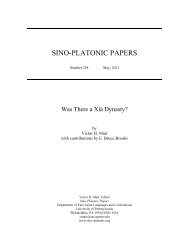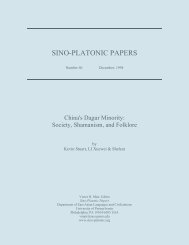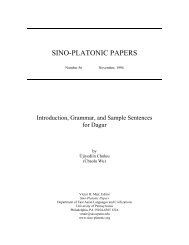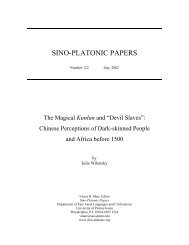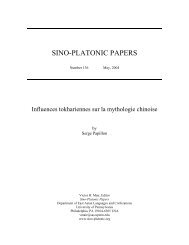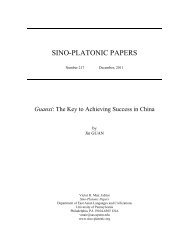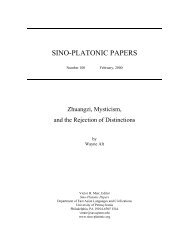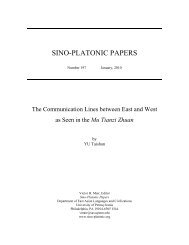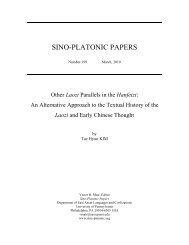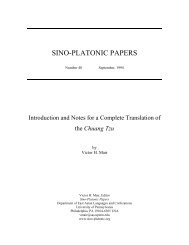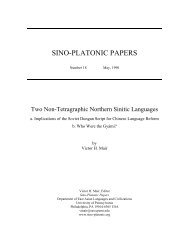Essays on Writing and Language in Honor - Sino-Platonic Papers
Essays on Writing and Language in Honor - Sino-Platonic Papers
Essays on Writing and Language in Honor - Sino-Platonic Papers
You also want an ePaper? Increase the reach of your titles
YUMPU automatically turns print PDFs into web optimized ePapers that Google loves.
S<strong>in</strong>o-Plat<strong>on</strong>ic <strong>Papers</strong>, 27 (August 3 1, 199 1)<br />
archetypes <strong>and</strong> the same cultural cast of characters that's <strong>in</strong> an American's head. We are as<br />
familiar with Rimbaud as they are with Rarnbo. In fact, compared to the difference between<br />
Ch<strong>in</strong>a <strong>and</strong> the U.S., American culture <strong>and</strong> <strong>and</strong> French culture seem about as different as Peter<br />
Pan <strong>and</strong> Skippy peanut butter.<br />
Speak<strong>in</strong>g with a Ch<strong>in</strong>ese pers<strong>on</strong> is usually a different matter. You just can't drop Dickens,<br />
Tarzan, Jack the Ripper, Goethe, or the Beatles <strong>in</strong>to a c<strong>on</strong>versati<strong>on</strong> <strong>and</strong> expect to be understood.<br />
I have a Ch<strong>in</strong>ese friend who at <strong>on</strong>e time had read the first translati<strong>on</strong>s of Kafka <strong>in</strong>to Ch<strong>in</strong>ese, yet<br />
didn't know who Santa Claus was. And forget about menti<strong>on</strong><strong>in</strong>g anyth<strong>in</strong>g as current as<br />
Mad<strong>on</strong>na or Teenage Mutant N<strong>in</strong>ja Turtles; you will get a very, very blank stare. (American<br />
movies <strong>and</strong> TV shows, staple enterta<strong>in</strong>ment fare <strong>in</strong> other parts of the world for decades, have<br />
<strong>on</strong>ly recently been allowed <strong>in</strong>to Ch<strong>in</strong>a.) They will know a lot about Nix<strong>on</strong>, of course, but d<strong>on</strong>'t<br />
be surprised if they tell you with a straight face that he was the greatest American president of the<br />
twentieth century.<br />
Similarly, how many Americans other than s<strong>in</strong>ophiles have even a rough idea of the<br />
chr<strong>on</strong>ology of Ch<strong>in</strong>a's dynasties? Has the average history major here ever heard of @n Shi<br />
Huang Di <strong>and</strong> his c<strong>on</strong>tributi<strong>on</strong> to Ch<strong>in</strong>ese culture? How many American music majors have ever<br />
heard a note of Pek<strong>in</strong>g Opera, or would recognize a pipd if they tipped over <strong>on</strong>e? How many<br />
otherwise literate Americans have heard of Lu Xun, Ba J<strong>in</strong>, or even Mozi?<br />
What this means is that when Americans <strong>and</strong> Ch<strong>in</strong>ese get together, there is often not just a<br />
language ban-ier, but an immense cultural barrier as well. Of come, this is <strong>on</strong>e of the reas<strong>on</strong>s<br />
the study of Ch<strong>in</strong>ese is so <strong>in</strong>terest<strong>in</strong>g. It is also <strong>on</strong>e of the reas<strong>on</strong>s it is so damn hard.<br />
C<strong>on</strong>clusi<strong>on</strong><br />
I could go <strong>on</strong> <strong>and</strong> <strong>on</strong>, but I figure if the reader has bothered to read this far, I'm preach<strong>in</strong>g to<br />
the c<strong>on</strong>verted, anyway. Those who have tackled other difficult languages have their own litany<br />
of horror stories, I'm sure. But I still feel reas<strong>on</strong>ably c<strong>on</strong>fident <strong>in</strong> assert<strong>in</strong>g that, for an average<br />
American, Ch<strong>in</strong>ese is significantly harder to learn than any of the other thirty or so major world<br />
languages that are usually studied formally at the university level (though Japanese <strong>in</strong> many ways<br />
comes close). Not too <strong>in</strong>terest<strong>in</strong>g for l<strong>in</strong>guists, maybe, but someth<strong>in</strong>g to c<strong>on</strong>sider if you've<br />
decided to better yourself by learn<strong>in</strong>g a foreign language, <strong>and</strong> you're th<strong>in</strong>k<strong>in</strong>g "Gee, Ch<strong>in</strong>ese<br />
looks k<strong>in</strong>da neat."<br />
It's pretty hard to quantify a process as complex <strong>and</strong> multi-faceted as language-learn<strong>in</strong>g, but<br />
<strong>on</strong>e simple metric is to simply estimate the time it takes to master the requisite language-learn<strong>in</strong>g<br />
skills. When you c<strong>on</strong>sider all the above-menti<strong>on</strong>ed th<strong>in</strong>gs a learner of Ch<strong>in</strong>ese has to acquire -<br />
ability to use a dicti<strong>on</strong>ary, familiarity with two or three romanizati<strong>on</strong> methods, a grasp of<br />
pr<strong>in</strong>ciples <strong>in</strong>volved <strong>in</strong> writ<strong>in</strong>g characters (both simplified <strong>and</strong> traditi<strong>on</strong>al) - it adds up to an awful<br />
lot of down time while <strong>on</strong>e is "learn<strong>in</strong>g to learn", Ch<strong>in</strong>ese.<br />
How much harder is Ch<strong>in</strong>ese? Aga<strong>in</strong>, 1'11 use French as my can<strong>on</strong>ical "easy language".<br />
This is a very rough <strong>and</strong> <strong>in</strong>tuitive estimate, but I would say that it takes about three times as l<strong>on</strong>g<br />
to reach a level of comfortable fluency <strong>in</strong> speak<strong>in</strong>g, read<strong>in</strong>g, <strong>and</strong> writ<strong>in</strong>g Ch<strong>in</strong>ese as it takes to<br />
reach a comparable level <strong>in</strong> French. An average American could probably become reas<strong>on</strong>ably<br />
fluent <strong>in</strong> two Romance languages <strong>in</strong> the time it would take them to reach the same level <strong>in</strong><br />
Ch<strong>in</strong>ese.<br />
One could perhaps view learn<strong>in</strong>g languages as be<strong>in</strong>g similar to learn<strong>in</strong>g musical <strong>in</strong>struments.<br />
Despite the esoteric glories of the harm<strong>on</strong>ica literature, it's probably safe to say that the piano is a<br />
lot harder <strong>and</strong> more time-c<strong>on</strong>sum<strong>in</strong>g to learn. To extend the analogy, there is also the fact that we<br />
are all virtuosos <strong>on</strong> at least <strong>on</strong>e "<strong>in</strong>strument" (namely, our native language), <strong>and</strong> learn<strong>in</strong>g<br />
<strong>in</strong>struments from the same family is easier than embark<strong>in</strong>g <strong>on</strong> a completely different <strong>in</strong>strument<br />
A Spanish pers<strong>on</strong> learn<strong>in</strong>g Portugese is comparable to a viol<strong>in</strong>ist tak<strong>in</strong>g up the viola, whereas an<br />
American learn<strong>in</strong>g Ch<strong>in</strong>ese is more like a rock guitarist try<strong>in</strong>g to learn to play an elaborate 30-stop<br />
three-manual pipe organ.<br />
Some<strong>on</strong>e <strong>on</strong>ce said that learn<strong>in</strong>g Ch<strong>in</strong>ese is "a five-year less<strong>on</strong> <strong>in</strong> humility". I used to th<strong>in</strong>k<br />
this meant that at the end of five years you will have mastered Ch<strong>in</strong>ese <strong>and</strong> learned humility al<strong>on</strong>g<br />
the way. However, now hav<strong>in</strong>g studied Ch<strong>in</strong>ese for over six years, -1 have c<strong>on</strong>cluded that




